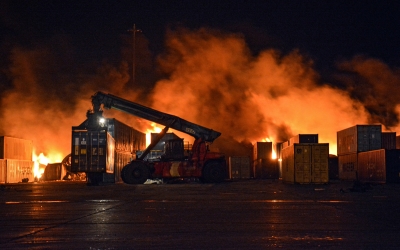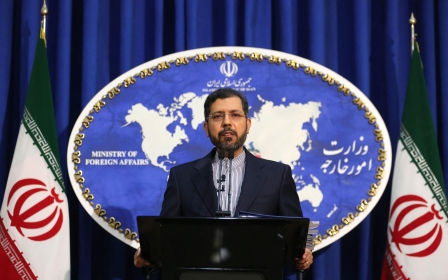Ukraine-Russia crisis: Israel fears US sanctions could affect Syria operations, says report

Israeli officials have expressed concerns that US sanctions against Russia in response to a potential invasion of Ukraine could harm Israel's security interests in Syria, according to a report by Walla news.
Citing unnamed officials, the news website said Israel's close ties with Washington could jeopardise its coordination with Moscow on operations in Syria, where Israel has launched hundreds of air strikes aimed at preventing Iran from taking advantage of the country's chaos in the aftermath of the decade-long civil war.
"US sanctions against Russia put Israel in a very embarrassing position," an official was quoted as saying. "The United States is a long-standing stable ally, but Israel needs Russia given the circumstances in the Middle East."
US President Joe Biden issued an executive order on Monday that imposed sanctions on two Russia-backed breakaway republics in eastern Ukraine after Russian President Vladimir Putin recognised the regions as independent from Kyiv.
The White House's principal deputy national security adviser, Jonathan Finer, used the term "invasion" on Tuesday to describe Russia’s deployment of troops into two pro-Russian separatist regions of Ukraine.
Biden will give an address later on Tuesday as the White House prepares to announce new "significant" sanctions on Moscow in retaliation for Putin's actions.
Israel has yet to officially comment on the sanctions issued by Washington. On Sunday, Israeli Foreign Minister Yair Lapid said his country "will consider what course to take" when asked in an interview whether it would follow in the US's footsteps and sanction Russia.
The conflict in Ukraine puts Israel in a difficult position, with the country being a long-standing, close ally of the US yet also having good relations with both Russia and Ukraine.
Several Israeli officials said on Monday that if they had to choose between the two sides, Russia or the US, they would have to side with Washington.
"Our heart is in the direction of the United States," Diaspora Affairs Minister Nachman Shai told Channel 12, adding that Israel was working hard not to "take a clear public position, with the great hope that this crisis will end without fire, without casualties and without a military confrontation".
Russia 'deeply concerned' over Israeli strikes
Russia and Israel have sought to manage the situation in Syria and in 2015 established a hotline to avoid clashes in Syrian airspace.
Eran Lerman, a former deputy director at Israel’s National Security Council, previously told MEE that Israel was "committed to ensuring they do nothing that ends up killing Russians on Syrian soil", and part of that process is to make certain ahead of time that Russian aircraft are not in the areas Israel is targeting.
However, recently Russia expressed "deep concern" over Israel's ongoing strikes in Syrian territory, saying they could escalate tensions in the area and endanger commercial flights.
"Israel's continuing strikes against targets inside Syria cause deep concern," Foreign Ministry spokeswoman Maria Zakharova said earlier this month, as quoted by the TASS news agency.
"Once again we are insistently calling upon the Israeli side to refrain from such use of force," she said.
Russia has also recently announced it was carrying out joint military jet patrols with the Syrian air force of the airspace along Syria’s borders, including in the Israeli-occupied Golan Heights area, prompting speculation that Israel would be more hesitant to strike Syria.
This article is available in French on Middle East Eye French Edition
Middle East Eye delivers independent and unrivalled coverage and analysis of the Middle East, North Africa and beyond. To learn more about republishing this content and the associated fees, please fill out this form. More about MEE can be found here.






